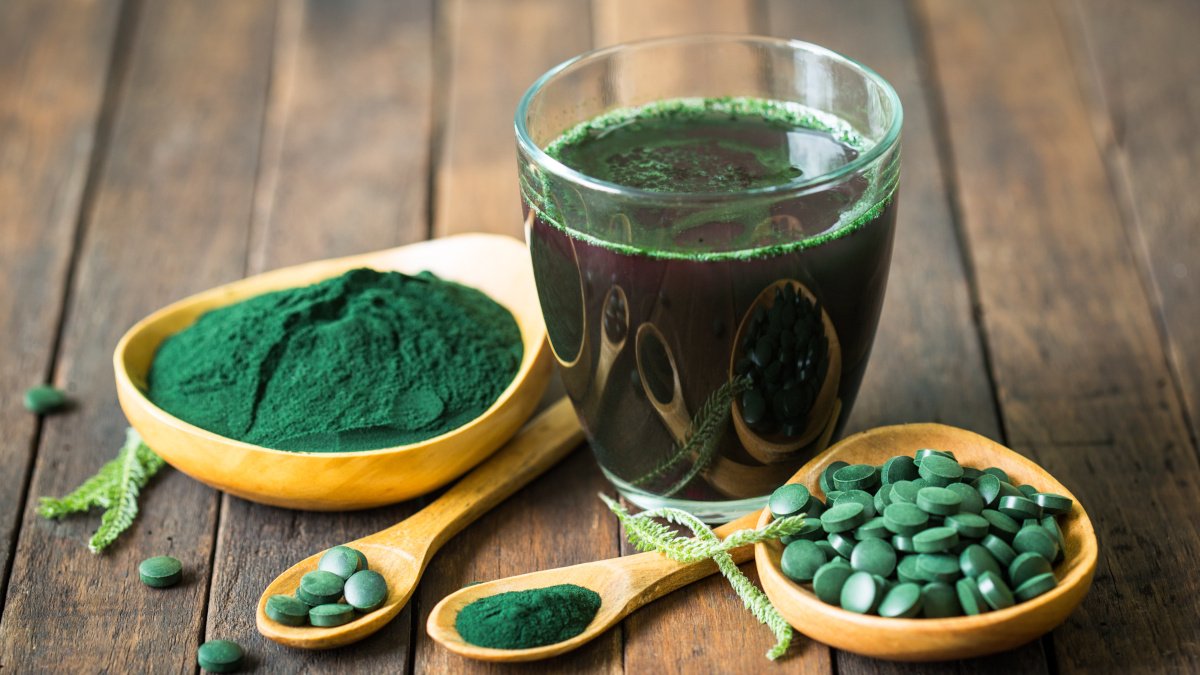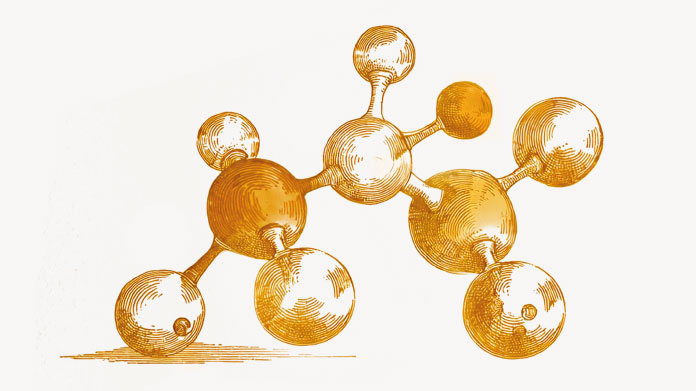Spirulina: when and how should you take it?
Often referred to as a ‘miracle algae’, spirulina is a superfood highly recommended by the WHO. But what exactly is it? What benefits does it offer and how much do you need?

Spirulina: an ancient mixture of cyanobacteria
It was during the conquest of Central America that Europeans discovered spirulina. It was then consumed by the Aztecs, who grew it in Lake Texcoco, close to Mexico, to produce a highly-nutritious mash (1).
Westerners later discovered that a similar kind of algae was grown in Africa, particularly in Chad and the Sahara region, where the locals used it to make pancakes, which, for example, were given to expectant mothers in times of food scarcity to enable their pregnancies to progress well (2).
Spirulina has thus been consumed for thousands of years as a basic food in times of shortage in many parts of the world.
It is considered to be a type of micro-algae or more specifically, a mix of cyanobacteria, in particular Arthrospira platensis, which is easy to cultivate and control.
Today, spirulina’s many nutritional benefits, the most important of which is its very high protein content, have led to the creation of food programmes aimed at producing large quantities of spirulina in areas affected by malnutrition, particularly Africa (3-5).
In addition, it is now widely grown for the manufacture of dietary supplements, in the form of powder, flakes or tablets, in China (the world’s largest producer), in the United States, in Africa and even in France by small specialist producers.
Health-friendly micro-algae
The reason so many programmes aimed at combatting malnutrition use spirulina to help affected populations is that it contains:
- almost every essential amino acid (6) ;
- a large amount of protein, in the region of 50%-70% of its dry matter (7) ;
- countless nutrients such as vitamins, minerals and essential fatty acids, etc. (8)
However, in order to obtain these nutritional benefits, you need to consume large amounts of spirulina - several hundred grams a day to meet adult daily requirements and provide the necessary nutrients.
Thus in developed countries, it is not consumed for the protein, iron, beta-carotene or essential fatty acids it provides, since a ‘normal’ modern diet, even a vegan or vegetarian one, is far richer in these than is spirulina.
Instead, with interest in spirulina having grown steadily in the West since the 1970s, scientists have been focusing on its health benefits and have discovered that this cyanobacteria:
- promotes energy and vitality (9) ;
- supports weight control by promoting the feeling of satiety (10-11) ;
- and is an immunostimulant (12).
Note: spirulina is often mentioned as a plant source of vitamin B12, and thus a good choice for vegans who do not eat any animal products. However, most recent studies have shown that the vitamin B12 in spirulina may not be bioavailable to humans (13).
When and how should spirulina be consumed?
The majority of studies conducted on supplementation with spirulina have tested doses ranging from 1g to 6g a day. A daily dose of around 4g (that’s 8 tablets containing around 500mg each) would therefore seem to be a good compromise in order to benefit from spirulina’s revitalising and immunostimulant effects (14).
The time the supplement is taken does not seem to affect its efficacy. You can therefore either take your 4g in one go, or spread across the day with several meals.
Choosing a good quality spirulina
In 2017, following several reports of adverse side-effects linked to taking spirulina, an investigation was conducted by an organisation dealing with health and safety called Anses which identified a number of risks associated with taking this blue-green algae. Indeed, like all forms of algae, spirulina grown in poor conditions can become contaminated by heavy metals, cyanotoxins and bacteria.
In addition to noting the risks of allergy which are difficult to assess prior to a first dose of a spirulina-based supplement, Anses primarily recommends that consumers choose a spirulina supplement produced via safe, regulated channels (15). This is precisely the case with Spirulina tablets, which are made by the top spirulina producer ‘Parry Organic Spirulina’, using strictly-controlled aquaculture.
References
- ALI, Shabana Kouser et SALEH, Arabi Mohammed. Spirulina-an overview. International journal of Pharmacy and Pharmaceutical sciences, 2012, vol. 4, no 3, p. 9-15.
- ABDULQADER, Gatugel, BARSANTI, Laura, et TREDICI, Mario R. Harvest of Arthrospira platensis from Lake Kossorom (Chad) and its household usage among the Kanembu. Journal of applied phycology, 2000, vol. 12, no 3, p. 493-498.
- FOX, Ripley D. Spirulina: The Alga That Can End Malnutrition. Futurist, 1985, vol. 19, no 1, p. 30-35.
- MASUDA, Kazuya, INOUE, Yuta, INOUE, Ryo, et al.Spirulina effectiveness study on child malnutrition in Zambia. 2014.
- RR, Siva Kiran, MADHU, G. M., et SATYANARAYANA, S. V. Spirulina in combating protein energy malnutrition (PEM) and protein energy wasting (PEW)-A review. Journal of Nutrition Research, 2015, vol. 3, no 1, p. 62-79.
- CLÉMENT, Genevieve, GIDDEY, C., et MENZI, R. Amino acid composition and nutritive value of the alga Spirulina maxima. Journal of the Science of Food and Agriculture, 1967, vol. 18, no 11, p. 497-501.
- DEVI, M. Anusuya, SUBBULAKSHMI, G., DEVI, K. Madhavi, et al.Studies on the proteins of mass-cultivated, blue-green alga (Spirulina platensis). Journal of agricultural and food chemistry, 1981, vol. 29, no 3, p. 522-525.
- KHAN, Zakir, BHADOURIA, Pratiksha, et BISEN, P. S. Nutritional and therapeutic potential of Spirulina. Current pharmaceutical biotechnology, 2005, vol. 6, no 5, p. 373-379.
- CAPELLI, Bob et CYSEWSKI, Gerald R. Potential health benefits of spirulina microalgae. Nutrafoods, 2010, vol. 9, no 2, p. 19-26.
- DINICOLANTONIO, James J., BHAT, Anusha G., et OKEEFE, James. Effects of spirulina on weight loss and blood lipids: a review. Open heart, 2020, vol. 7, no 1, p. e001003.
- PANCHOLI, Deepika et QURESHI, Ikram. Nutritional Influence (Spirulina) of Biochemical and Obese Stress Patients. Journal of Biological and chemical Chronicles, 2019, vol. 5, no 1, p. 11-13.
- LØBNER, Morten, WALSTED, Anette, LARSEN, Rune, et al.Enhancement of human adaptive immune responses by administration of a high-molecular-weight polysaccharide extract from the cyanobacterium Arthrospira platensis. Journal of Medicinal Food, 2008, vol. 11, no 2, p. 313-322.
- EDELMANN, Minnamari, AALTO, Sanni, CHAMLAGAIN, Bhawani, et al.Riboflavin, niacin, folate and vitamin B12 in commercial microalgae powders. Journal of Food Composition and Analysis, 2019, vol. 82, p. 103226.
- DENG, Ruitang et CHOW, Te‐ Hypolipidemic, antioxidant, and antiinflammatory activities of microalgae Spirulina. Cardiovascular therapeutics, 2010, vol. 28, no 4, p. e33-e45.
- https://www.anses.fr/fr/content/compl%C3%A9ments-alimentaires-%C3%A0-base-de-spiruline-privil%C3%A9gier-les-circuits-d%E2%80%99approvisionnement
Keywords
18 Hours
Very good experience
Very good experience, the products arrived in time, in perfect condition and are good quality. Thank you.
GABI TIRCOCI
6 Days
very good expereince
very good expereince
Jelena Đaković
6 Days
Very good products.
Very good products.
Agnes BENDSAK
8 Days
Just OK
Just OK, ordering from company for many years and being safisfied
Lynn Mae
9 Days
Recomendo
Produtos encomendados são recebidos atempadamente e de acordo com o anunciado! Muito satisfeita!
Carla Sofia
9 Days
Everything is great!
Everything is great!
Jonas
14 Days
The delivery was fast and the product…
The delivery was fast and the product is great
SOMMARIVA Gianni
15 Days
Great service and lots of information
Great service and lots of information
Gabi
19 Days
Service Satisfaction
I’m satisfied with the service; it fulfilled what it set out to do.
Anfhony Abreu
21 Days
Original product and fast delivery
Original product and fast delivery. I haven't started it yet, but will do soon.
Vincenza Catania
24 Days
Good quality
Good quality. Good service.
Leonel Guzman
26 Days
Top!!!!!!!!
Top!!!!!!!!
Michael
28 Days
Excellent!
Products are great and delivered fast!
PARDINI Debora
29 Days
From order to receive the product
From order to receive the product, the process is smooth & fast. It’s good to customers.
WONG Mei Ling
30 Days
Fast delivery
very quick delivery to italy. product is good.
Customer
of experience
your money back
##montant## purchase




